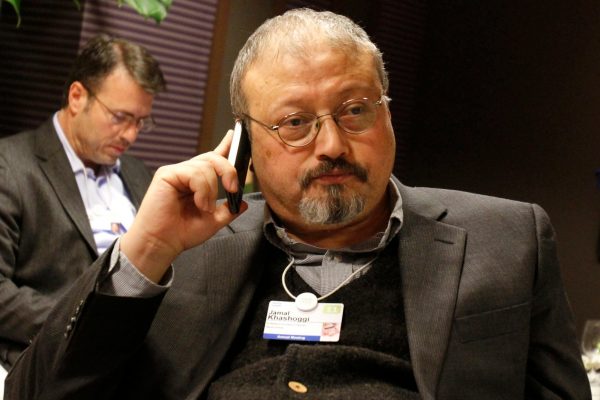
This article was last updated on April 16, 2022
Canada: ![]() Oye! Times readers Get FREE $30 to spend on Amazon, Walmart…
Oye! Times readers Get FREE $30 to spend on Amazon, Walmart…
USA: ![]() Oye! Times readers Get FREE $30 to spend on Amazon, Walmart…
Oye! Times readers Get FREE $30 to spend on Amazon, Walmart…
While I generally do not post on the same organization two days in a row, a recent little-covered blog posting on the Atlantic Council website is just begging to be exposed, particularly since it relates to Saudi Arabia, the recent death of journalist Jamal Khashoggi and the revelations about the possible connections to Saudi Prince Mohammed bin Salman.
The posting was written by Atlantic Council President and CEO Frederick Kempe. Here is his biography:
He is obviously a very influential individual, particularly with his connections to the Wall Street Journal.
Before we dig into the posting, here is what appeared on the Atlantic Council’s Twitter feed on November 25th, 2018:
With that background, let’s look at the contents of the posting itself. The author opens by noting how the “toxic aftermath” of the Khashoggi murder could trigger the worst regional war that the Middle East has experienced with the following potential scenario:
“Iranian-backed Houthi militia in Yemen break a fragile ceasefire with a missile launched at Riyadh, the Saudi capital. Unlike so many before it, this missile slips through Saudi air defenses and lands on a shopping mall in early evening, the busiest time of the day.
The strike takes mass casualties and sets off panic.
Saudi Crown Prince Mohammed bin Salman, already rattled by US and European backlash from the Khashoggi killing, blames Teheran for the attack, knows he must respond, but is unsure what allies he can count on. Advisers argue he must strike Iran itself, given the scale of the carnage, the pointlessness of striking targets in Yemen, and questions swirling about his leadership.
However, he lacks the offensive and defensive wherewithal for a sustained war with Iran. He considers two options: a secure call to President Donald Trump to request he join his Saudi Allies against their common foe. Or, alternatively, the Saudi Air Force strikes Iran, provoking a counterstrike that it hopes will bring American allies into the fighting.”
He goes on to note that the Trump White House will face a conundrum; does the United States back a “tainted ally” or take no action at all and risk the consequences of inaction to the fragile Middle East/Saudi Arabia/Iran “peace”?
While the author does allow that the murder of Khashoggi was “brutal, foolish and irresponsible”, his greater concern is that the ultimate consequences could be the weakening of United States relations with its European partners, resulting in a “strengthening (of) the growing role of China and Russia”. He also notes that:
“…it would be better to leverage the current situation to achieve larger US aims in the region – consistent with values and interests – rather than to respond in a manner that might be satisfying over the short-term but self-defeating strategically.”
The author goes on to state that the “biggest prize” is the ability of the United States to keep Saudi Arabia on a course that prevents the laying of groundwork for the formation of another al-Qaeda and that Washington must consider that it is entirely likely that Crown Prince Mohammed bin Salman will survive this inconvenient truth and that he will rule Saudi Arabia for decades to come. As such, the United States must focus on a long-term strategic project to prevent new conflicts, end the regions civil wars in Libya, Yemen and Syria and prevent Islamic extremism.
Here are Mr. Kempe’s closing paragraphs:
“Though Crown Prince Mohammed Bin Salman can’t undo the Khashoggi crime, he could refocus Western thinking over time by redoubling his efforts to reform Saudi society, not only providing women more rights but also releasing from prison the activists he recently arrested.
For starters, Western and Middle Eastern leaders need to avoid worst outcomes in the region. Even better would be to leverage the crisis to achieve some good.“
In other words, Mr. Khashoggi’s death was completely acceptable when framed in terms of the good that it might do in reforming Saudi Arabia’s medieval society under the rule of the man who may well have ordered his death. That’s quite a trade-off.
Given this from August 2018:
…this from August 2018:
…and this from November 2018:
…it certainly looks like Mr., Kempe, the head of a think-tank funded by the military-industrial complex and governments in the Middle East, is living in a technicolour dreamworld when it comes to Saudi societal reformations under its future King, no matter how he may think that the world can leverage this crime “to achieve some good”.
Click HERE to read more from this author.
You can publish this article on your website as long as you provide a link back to this page.

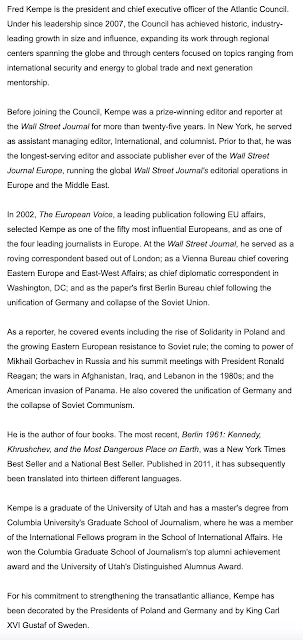
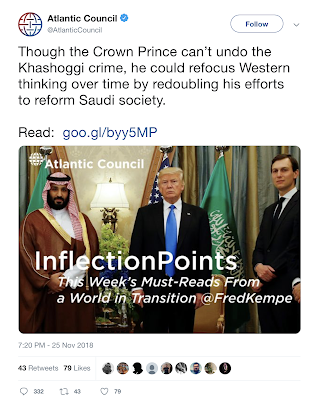
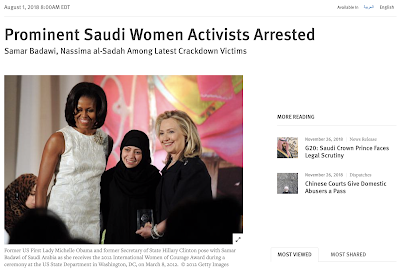
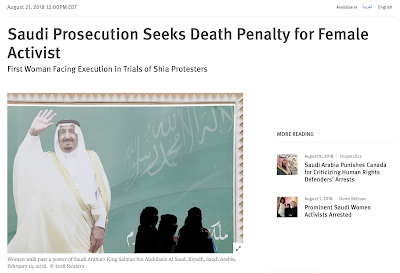
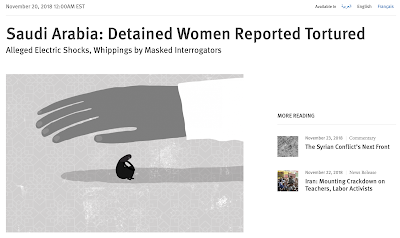
Be the first to comment